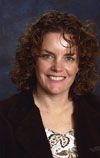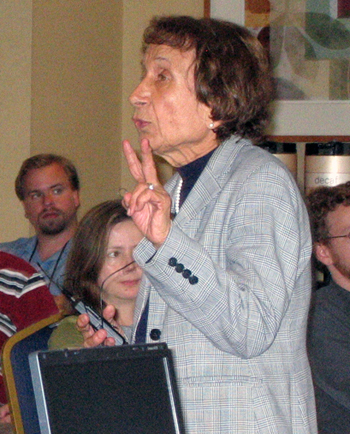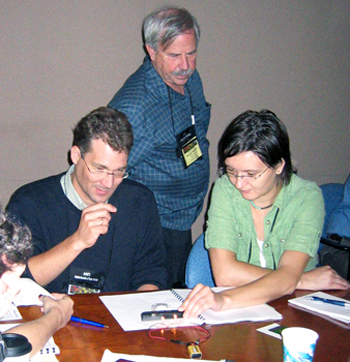2008 July Announcements
News Items
July 2008
 Diane Riendeau, an active member of AAPT, is the 2008
Diane Riendeau, an active member of AAPT, is the 2008
recipient of the American Association for the
Advancement of Science (AAAS) Leadership in Science
Education Prize for High School Teachers. Award winners
are selected based on the development and
implementation of innovative methods used in the
classroom that demonstrate an effective strategy,
activity, or program.
Riendeau notably credits 2002-03 AAPT President Christopher Chiaverina, Physics Northwest, AAPT meetings, and her teaching colleagues at Barrington and Deerfield High schools to aiding the success of the “Make It, Take It, Teach It” program. The program encourages students to use hands-on learning and building ownership by “making it.” Students make items such as a standing-wave generator, CD hovercraft, and gel candles to observe basic physics concepts. The students are then allowed to “take it” home in hopes of initiating physics conversations outside of the classroom. Finally, the students must “teach it” to someone else, such as their parents, which allows the students to see how much information they have retained from class as well as what areas need more focus.
The program has been proven successful by using surveys to question both the students and parents on the process. Consequently, a growing number of physics classes being offered at
Riendeau doesn’t want learning to “end at the bell.” She thinks that “‘Make It, Take It, Teach It’ is a fantastic way to increase student understanding of physics, include parents as learners of physics, and increase interest in physics in general.”
The AAAS award offers an annual prize of $1000 to qualified high school science teachers that contribute to advancing science education for a wide range of students.
![]()
“He’s not teaching us anything – we have to learn it all ourselves.”
The grumpy student evaluation got a laugh when Eric Mazur quoted it, because it illustrates the very thing he wants students to do — learn physics for themselves.
Mazur is Balkanski Professor of Physics and Applied Physics at Harvard University. He spoke to about 90 young college and university physics and astronomy professors at the twice-yearly New Faculty Workshop, organized by AAPT and held June 26 – 29 at the American Center for Physics in College Park, Maryland.
More than a dozen noted scientist-educators were on the conference program. They focused on instructional strategies that included interactive teaching, open-ended experiments, and ongoing learning assessment. Conferees went home with back-packs full of materials featuring new classroom approaches.
 |
| Lillian McDermott spoke on Research in Physics Education. |
David Sokoloff, University of Oregon, and Ronald Thornton, Tufts, gave a lecture-demonstration and conducted a series of small group sessions using their manual, Real-Time Physics and Interactive Lecture Demonstrations, designed for high-school and college physics classes. Before they begin a demonstration or lab they ask students to predict the outcome. The students then discuss their predictions with each other and vote for the ones they think are right. After the experiment they compare their choices to the actual findings.
The intensive four-day workshop also gave participants a chance to share problems they have encountered:
“I have to do all this social work in my department.”
“My students don’t like me.”
“Mine don’t come to class.”
A number of workshop speakers proposed ways to improve on the traditional practice of lecturing. The lecture method has been under attack for more than a generation, but it still prevails.
“Teaching by telling is ineffective,” said Lilliam McDermott, Director of the Physics Education Group at the University of Washington, Seattle. Assisted by Peter Shaffer and MacKenzie Stetzer, also of the UW physics department, she conducted a table-top experiment underscoring the value of hands-on experimentation, and stressed the importance of systematic learning evaluation.
The dark side of lecturing was illuminated by astronomer Edward Prather, University of Arizona during his presentation on learner-centered teaching. Prather performed a mini-lecture: “The Montillation of Traxoline.”
What is traxoline? Why, it’s a new form of zionter, of course. The parody lecture is gibberish, dressed up with bogus techno terms and fake questions.
 |
| Robert Ros and Emilia Morosan set up an optics experiment as workshop leader Ronald Thornton looks on. |
Other large session speakers included Karen Cummings of Southern Connecticut State University, speaking on assessment and evaluation, and Evelyn Patterson, U.S. Air Force Academy, speaking on Just-In-Time Teaching (JITT). Kenneth Heller, University of Minnesota, led sessions on problem-solving.
A final large session featured AIP Vice-President and former AAPT Board President Jim Stith, whose talk was titled “Making a Difference: Teaching for Retention.” Stith presented real-life scenarios that raised issues of classroom discrimination. He was assisted by Workshop Chair Robert Hilborn, University of Texas, Dallas.
Small group discussions, in addition to those run by Sokoloff, Thornton, and Heller, focused on Physlets /Open Source Physics and digital libraries; issues of B.S., M.S. and Ph.D.-granting institutions; introductory physics, astronomy and upper-level physics teaching; Quantum Interactive Learning Tutorials (QuiLT); and tenure matters and time management. Presiders included Hilborn; Ann Cox of Eckerd College; Mario Belloni, Davidson College; Bruce Mason, University of Oklahoma; and Chandralekha Singh, University of Pittsburgh.
Sessions on grant writing and funding opportunities were led by Wendy Fuller-Mora of the National Science Foundation and Richard Wiener of Research Corporation. Richard Berg, University of Maryland, gave an after-dinner show titled “The Physics IQ Test.”
The workshop was supported in part by a grant from NSF. On hand for the opening were officers from co-sponsoring organizations: Charles Holbrow of AAPT, Judy Franz of APS, and Jennifer Grier of AAS. They were joined by Fred Dylla, Executive Director of the American Institute of Physics, of which AAPT, AAS and APS are members.
The next New Faculty Workshop is set for November 6 – 9. For more information see http://www.aapt.org/Events/newfaculty.cfm.

